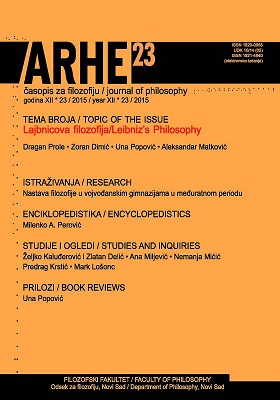Logos i spoznaja u Heraklitovoj filozofiji
Logos and Cognition in the Heraclitus’ Philosophy
Author(s): Ana MiljevićSubject(s): Epistemology, Ancient Philosphy, Philosophy of Mind, Cognitive Psychology, Ontology
Published by: Филозофски факултет, Универзитет у Новом Саду
Keywords: Heraclitus; λόγος (logos); φρόνησις (prudence); τὸ σοφόν (wise); cognition; method; paradox;
Summary/Abstract: This paper reviews the essential terms of Heraclitus’ philosophy through the comparative and analytical study of fragments which, by their own chiastic structure, by parallelism between the parts inside each of fragments and by rhythmic and etymologic play, form paradoxes. It is not unlikely that Heraclitus deliberately chose his highly paradoxical style and we have to ask why he did so. If the logos expresses itself in a Being through the paradoxes then it should be possible to recognize this expression also by the paradox. Since Heraclitus uses paradoxes to form the fundamental ontological terms, this poses a question if the logos of being expressed like this, indicates a method which is determined in advance. Our analysis has ascertained that the first fragment of Heraclitus (DK22 B1), which is by many authors called ”program fragment”, must be understood in that sense also in the methodological view. What the study of this fragment brings is the fact that Heraclitus uses an etymological and an analytical method by which the paradox inside the terms is cognitively formed and ontologically shown. In this context, the article establishes a connection of the term λόγος (logos) with the terms φρόνησις (prudence) and τὸ σοφόν (wise) through the Heraclitus expression ἓν τὸ σοφόν (one-wise).
Journal: Arhe
- Issue Year: 2015
- Issue No: 23
- Page Range: 139-160
- Page Count: 22
- Language: Serbian

